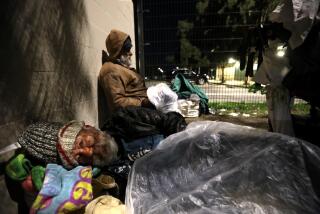Students Urged to Stand Up and Be Counted
- Share via
With census questionnaires arriving in homes already, the U.S. Census Bureau kicked off a nationwide effort this week targeting schoolchildren as crucial messengers in their households, hoping they might further stress to their parents the importance of filling out the census form.
As part of the awareness effort, called “Teach Census Week,” Lt. Gov. Cruz Bustamante paid a visit Tuesday to an eighth-grade history class at Washington Irving Middle School in northeast Los Angeles. Joining Bustamante in reaching out to the students were Census Bureau officials and Los Angeles Unified School District board member David Tokofsky.
The diverse crowd of 28 youngsters, at first collectively timid but slowly thawing to Tokofsky’s comments and Bustamante’s jokes, got to hear more than once how important their generation is in spreading the word about the census’ significance to their community.
“You can do it for your vecinos, your tios or tias, you can help out,” Bustamante said to the students, referring in Spanish to neighbors, uncles and aunts.
“When I was your age I wanted to do my own thing, eat and watch TV, “ he told the students. But their responsibility today is greater, he added, urging them to make sure that family members who don’t want to be noticed--sometimes because they fear law enforcement or Immigration and Naturalization Service officials--are counted.
The students were receptive to the message, as was evident from a classroom exercise in which they had to come up with ways to convince friends and neighbors that they should fill out the census.
“We could make posters and put them on the streets, and tell people that if you don’t fill it out a lot of the money won’t be contributed,” said 14-year-old Vanessa Lara.
Bustamante’s visit follows the release of a study last week showing that California stands to lose $5 billion, including $1.8 billion in Los Angeles County, if an undercount similar to that in the previous census is repeated this year.
The study was produced by PricewaterhouseCoopers for the Democratic appointees to the Census Monitoring Board, a bipartisan panel that is monitoring the 2000 census. Bustamante is among the Democrats on the eight-member national board.
Although some Republicans said the figures in the study were “estimates of estimates of estimates” and might not accurately predict the repercussions of undercounting, there was consensus across party lines that the study underscored the need to address the problem in this census.
Bustamante, Tokofsky and Census Bureau officials told students that 800,000 people were not counted in California during the last census, and that about half of them were children.
“That’s because parents forgot to include their children,” Jerry Wong of the Census Bureau said. “When you go home, make sure your parents list every single person living in the house.”
Tokofsky said counting everyone ensures that resources are given to all communities, including money for schools and learning programs. Sometimes people complain about pot holes or lack of good schools, he said, without realizing that the money for those things depends, in part, on people being counted.
“There is no risk, no danger in filling the census,” he said. “The risk is not having enough people be counted.”
More to Read
Sign up for Essential California
The most important California stories and recommendations in your inbox every morning.
You may occasionally receive promotional content from the Los Angeles Times.













